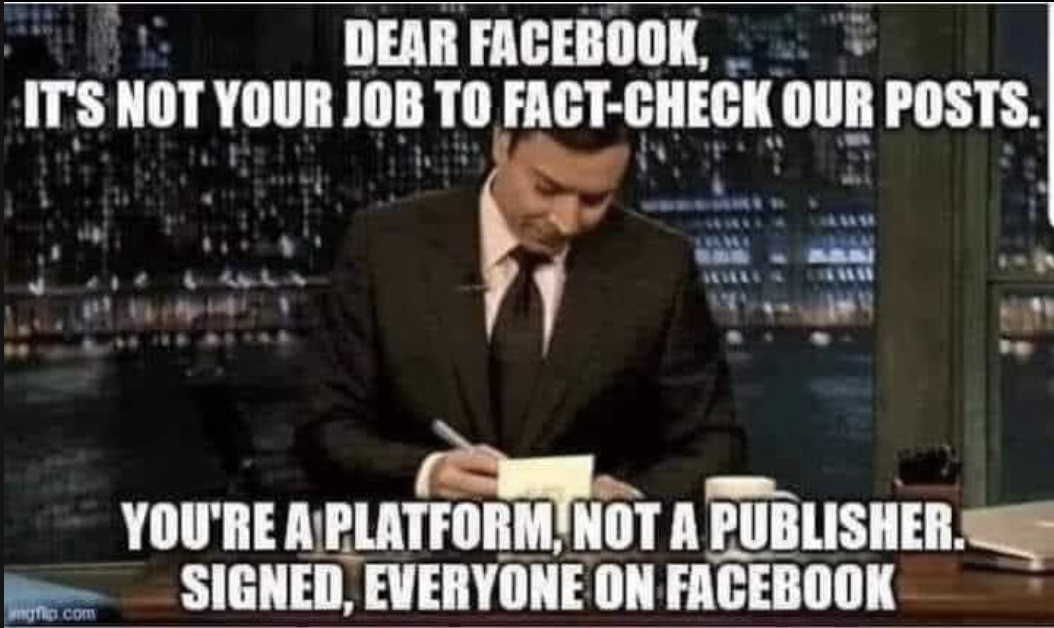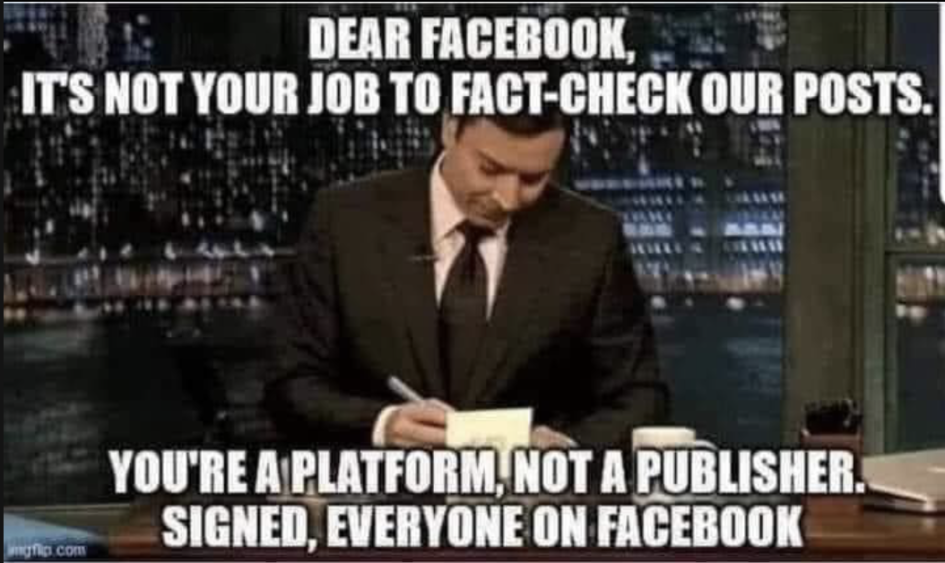In response to the meme below, a conversation ensued where I asserted Facebook is a platform not a publisher. Both movies, The Facebook Dilemma and The Social Dilemma came up in the conversation which led to this rather lengthy analysis of where I see problems with the the characterizations by the movies as well as those who argue in favor of Facebook fact checkers because people assume the platform is responsible for people’s actions in both some big and small ways.
If you’ve followed me on social media or on this blog, you’ll likely have gathered I am a willful woman and believe strongly in our own sovereignty as beings, our personal agency, as well as our own responsibility for the agency we assert in the world. Thus, for me, suggesting Facebook is responsible for the impact of the content it offers as a result of the accuracy (or lack) of the material presents some real challenge to me as a human and I see it as a multi-tiered issue.
Let’s start with a reasonable inquiry: at what level do they get to pick apart the information? For example, is it legitimate, as some so called fact checkers have asserted, that content is “false” because it is missing context? In a binary system of true vs false, something like missing context that isn’t substantially relevant is very different than missing context that is substantially relevant. Who gets to decide what is substantially relevant vs not substantially relevant? How did these so called fact checkers earn their qualifications to draw such conclusions? By what criteria and through what analysis are they arriving at the conclusions? Considering these questions alone means the assertion of missing context is contextually relevant in its own right. Not to mention the fact that fact checkers themselves may well warrant their own fact checkers to check their fact checking and resulting facts, which is a whole other level of depth to the problem of determining what is true or false and the degree to which that is so. To my thinking, this supports my premise that Facebook is a platform not a publisher because how can any single publisher have editorial control over the vast amount of content being shared on Facebook each hour, let alone each day?
A deeper issue then puts us in the wake of more serious considerations: at what level of fact checking should a platform be checking what’s being said? Should they be checking articles? All articles? Some articles? What’s the criteria to determine which are and are not checked? Is it dependent on the source? Is it determined depending on the history of the source? Does the political affiliation or bias of the source matter? It is dependent on being actively reported by users on the platform? What do we consider an article in this context? Is a blog post I write fact checked as well? Is ad content fact check? What if ads are videos? Is the fact checking done for only written word and still photographs? Aren’t videos (which I have only seen removed, not fact checked, although my lack of seeing it doesn’t mean it isn’t happening) more capable of conveying more (mis)information in a shorter period of time and often in a more compelling manner because of the visual appeal? What about live streamed content?
And then at a deeper level and one that literally impacts any user of the platform, are we to give them the authority and responsibility for analyzing any post on each wall and then monitoring each comment and the veracity therein? Are the fact checkers themselves even capable of comprehending the difference between facts and opinions? Can they discern interpretation from reporting? Again I say Facebook is a platform not a publisher and don’t we all want it to be that way lest we encourage their manipulation of the comments and content we post, not just articles and so called fake news?
 I find the thoughts in that last paragraph to be troubling to consider.
I find the thoughts in that last paragraph to be troubling to consider.
After watching both movies, I further take issue with the idea that a platform that dishes out content is responsible for people’s individual actions which both movies assert in their own way. If we can get past our bias that video games cause people to be more violent, how is this different? Seems to me — and perhaps I’m missing something — it’s the same sort of thinking, and yet we’ve dispelled the notion around video games but not around platform content which seems a bit paradoxical.
Here’s another way to consider it. Guns rights activists like to use the expression “guns don’t kill people; people kill people.” For reasons I’m not quite clear about, people object to this thinking, and yet, it’s absolutely accurate. A gun, like a knife or spoon or book, is a tool which may or may not be used as an assault weapon. How one wields the tool is in all ways subjectively dependent on the person, their experience, their values, their morality, their capabilities, and their willingness to act or not act based on their internal structures.
Put differently, I could sit here and say “shoot me — shoot me — shoot me” and even asking for it, that doesn’t mean you will. I dare say dear readers you would not, but that may simply be a commute issue! 😂😉
On a gross level and in terms of the broad strokes I think this is an important thing to consider because none of us, much as we might like it to be otherwise, can actually make people do things. If you doubt that, have a conversation with a frustrated parent whose child isn’t doing what they want them to do and wishes they would.
All of that said, I completely understand the idea that some people are more “vulnerable” — a concept that is not just about physical health and the immune compromised in a physiological sense, but which also extends to mental health and fortitude.
While it’s reasonable to acknowledge that people exist who have less mental fortitude, I do not think the answer is to coddle them and weaken their minds by limiting their exposure, a thesis Lukianoff and Haidt explored well in The Coddling of the American Mind (published first in short form as this piece in The Atlantic). I don’t claim they would agree with me using their works as evidence to support my position here though I’m not sure how different it really is either. Facebook is for 13+ year olds. Maybe some content, like with movies, could be rated like movies, but baring the non adult contingent on there which is a smaller percentage of the participants, I think we need to be treating adults like adults or they will never learn how to be an adult. How can you possibly learn to reason if you’re never challenged to do so? How can you ever comprehend the idea of distinguishing fact from fiction if the platform never allowed you to be exposed to both kinds of content? Isn’t our ability to evolve as a species in part because people have presented hypothesis over time that may or may not be true that then get tested and through the exploration of something a fact checker may deem to be “fake news” we actually see our own growth, not just individually but also on a species level?
Facebook is a reflection of the macrocosm around us. In the real world, we meet people who say things that contradict our world view on a regular basis. In fact, as we clamor for more inclusion and diversity, it is increasingly more imperative that people learn how to inculcate habits, reasoning, and philosophies that enable them to internalize the vast diversity of the planet around them. Learning how to interact with those people who have different beliefs, experiences, values, and morality is a critical life skill and it concerns me that people think it’s a good idea that Facebook should be monitoring, limited, censoring, or regulating this in some way. Not only doesn’t it prepare us for the real world around us and living with the very necessary experience of learning to agree to disagree, it shelters us from the concept itself when we encourage the platform to censor data and limit our exposure.
Take what happened with covid, hydroxychloroquine and the mounds of information has been pulled off the platform. This is a dangerous precedent to support in my opinion because it literally takes the power from the people and puts it in the hands of the technocrats.To support content removal means you disagree when I suggest Facebook is a platform not a publisher and you want to give them the editorial control of a publisher rather than the duties of a platform to serve content.
I don’t care how well intentioned Zuckerberg and his cohorts are. They do not deserve that sort of power and we the people are not truly in service of our own mental liberation to sit here and support it if you ask me.
I’m just one tiny voice in a planet of billions so few people will see these ideas and be influenced by them which is why they probably won’t censor me.
But the scary thing is that if you support them choosing what is and isn’t fake new, what is and isn’t acceptable, and what should and shouldn’t be censored, which is what supporting these fact checkers does, then the ideas I’m presenting in this post are in fact the sort of thing they might want to censor simply for going against the grain of their position.
I for one think that is a terrible direction for all of us, regardless of whether you agree that Facebook is a platform not a publisher.
